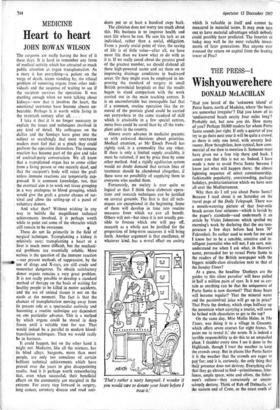Heart to heart
MEDICINE JOHN ROWAN WILSON
The surgeons are really having the best of it these days. It is hard to remember any form of medical activity which has attracted so much public attention as organ transplantation. As a story it has everything—a patient on the verge of death, teams standing by, the ethical problem of removing organs from other indi- viduals and the suspense of waiting to see if the recipient survives the operation. It was startling enough when we were talking about kidneys—now that it involves the heart, the emotional overtones have become almost un- bearable. Perhaps it is worth while living in the twentieth century after all. . . .
I take it that it is no longer necessary to explain the issues and techniques involved in any kind of detail. My colleagues on the dailies and the Sundays have gone into the subject so searchingly that most SPECTATOR readers must feel that at a pinch they could perform the operation themselves. The immune reaction has become part of the give and take of cocktail-party conversation. We all know that a transplanted organ has to come either from a living person or one recently dead, and that the recipient's body will reject the graft unless immune reactions are temporarily sup- . pressed. It is common knowledge, too, that the eventual aim is to work out tissue grouping in a way analogous to blood grouping, which would give the graft a greater chance of sur- vival and allow the setting-up of a panel of voluntary donors.
And what then? Without wishing in any way to belittle the magnificent technical achievements involved, it is perhaps worth while to point out some of the obstacles which still remain to be overcome. • These do not lie primarily in the field of surgical technique. Transplanting a kidney is relatively easy; transplanting a heart or a liver is much more difficult, but the mechani- cal problems are essentially soluble. More serious is the question of the immune reaction —our present methods, of suppression, by the '1111111k use of drugs and X-rays, are still crude and somewhat dangerous. To obtain satisfactory donor organs remains a very great problem. It is not• really possible to develop a standard method of therapy on the basis of waiting for healthy people to be killed in motor accidents, and the use of animal tissues is not on the cards at the moment. The fact is that the chances of transplantation moving away from its present role as a spectacular curiosity and becoming a routine technique are dependent on one particular advance. This is a method by which organs could be stored in deep freeze until a suitable time for use. That would indeed be a parallel to modern blood- transfusion techniques. Then we would really be in business.
It could happen, but on the other hand it might not. Medicine, like all the sciences, has its blind alleys. Surgeons, more than most people, are only too conscious of certain brilliant technical achievements which have proved over the years to give disappointing results. And it is perhaps worth remembering that, even when successful, their beneficial effects on the community are marginal in the extreme. For every step forward in surgery, lung cancer, coronary disease and road acci- dents put us at least a hundred steps back.
The clinician does not worry too much about this. His business is to improve health and save life where he can. He sees his task as an individual, rather than a social, obligation. From a purely social point of view, the saving of life is of little value—after all, we have more life than we know what to do with as it is. If we really cared about the greatest good of the greatest number, we should disband all these high-powered teams and set them on to improving drainage conditions in backward areas. Or they might even be employed in im- proving the standard of surgery in small British provincial hospitals so that the results began to stand comparison with the work carried out in the main teaching centres. It is an uncomfortable but inescapable fact that if a common, routine operation like the re- moval of the prostate gland could be carried out everywhere to the same standard of skill which is attainable in a few special centres, more lives could be saved than by all the trans- plant units in the country.
Almost every advance in medicine presents us with awkward decisions about priorities. Medical attention, as Mr Enoch Powell has sightly, said, is a commodity like any other. If -there is only a limited supply available, it must be rationed, if not by price then by some .other method. And a rigidly egalitarian system would no doubt demand that certain lines of treatment should be abandoned altogether, if there were no possibility of supplying them to everyone who needed them.
Fortunately, no society is ever quite so logical as that. I think these elaborate opera- tions and research techniques can be justified on several grounds. The first is that all tech- niques are exceptional in the beginning. Some of them will develop in time into routine measures from which we can all benefit. Others will not—but since it is not usually pos- sible to foresee which one will pay off, research as a whole can be justified -for the proportion of long-term successes it will bring forth. Another argument is that excellence, of whatever kind, has a moral effect on society which is valuable in itself and cannot be measured in material terms. It may even turn out to have material advantages which nobody could possibly have predicted. The luxuries of today may well be the most valuable invest- ments of later generations. Has anyone ever assessed the return on capital from the leaning tower of Pisa?


































 Previous page
Previous page